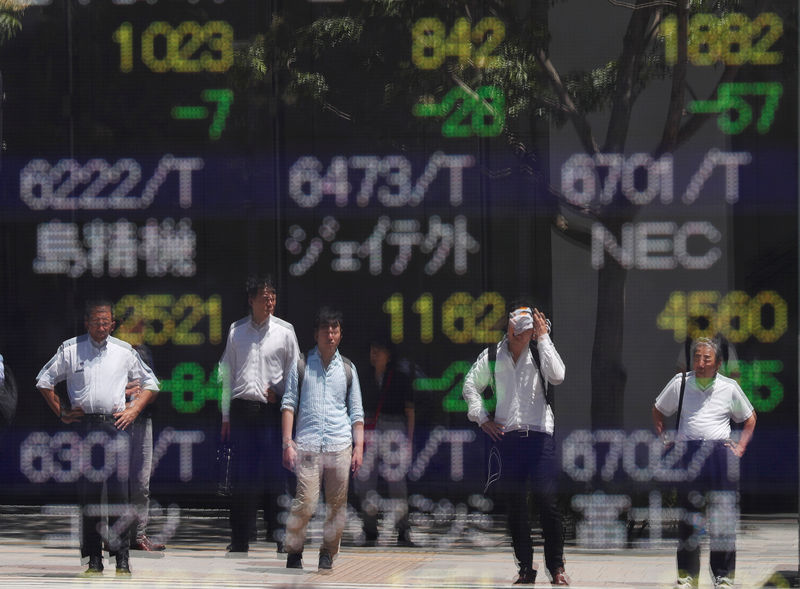By Marc Jones
LONDON (Reuters) - World shares were close to a record high on Monday, after Beijing surprised markets by trimming a key interest rate for the first time since 2015.
In the latest show of support for its economy, China's central bank cut rates on seven-day reverse repurchase agreements by five basis points to 2.50%.
The news helped Asia's main markets close higher (CSI300) (N225) (HSI) and Europe followed suit, though 0.1% to 0.3% moves showed the initial reaction was cautious.
It did nudge MSCI's 49-country world share index <..MIWD00000PUS> 0.12% higher to leave it less than 1% off the record high it set back in early 2018.
"It is a slow start to a slow week, but risk is marginally on," said Societe Generale (PA:SOGN) strategist Kit Juckes.
He added it was now hard to avoid concluding that China was slowly easing monetary policy, having held off in recent months, perhaps wary of drawing fresh criticism from U.S. President Donald Trump during trade talks.
"Maybe that's what 5 basis points is all about. It's not rocking the boat, but it's a shift."
The pan-European STOXX 600 index (STOXX) was extending its six-week winning streak. The index is only 8 points short of its own record high of 415.18 points hit in mid-April.
Japan's Nikkei (N225) gained 0.5% and was just short of its recent 13-month top. E-Mini futures pointed to S&P 500 (ESc1) adding to Friday's record highs. (N)
Beijing's latest policy bolstered to hopes it might also be more serious about making progress in trade talks with the United States.
On Saturday, Chinese state media said the two sides had "constructive talks" on trade in a high-level phone call that included Vice Premier Liu He, U.S. trade representative Robert Lighthizer and Treasury Secretary Steven Mnuchin.
"More than in previous rounds, we see momentum toward reaching at least a limited trade deal, and certainly a mini-deal would remove some of the negative sentiment overhang for the real economy and markets," said Patrik Schowitz, global multi-asset strategist at J.P. Morgan Asset Management.
"We have upgraded our outlook on equities as an asset class," he added. "Emerging-market equities are now our most favoured region alongside U.S. large-cap equities."
LOOKING TO THE FED
The dollar was little changed against other major currencies on Monday and within recent trading ranges. Volatility in the market has been the lowest in decades recently and shows no sign of shifting.
The dollar rose against the safe-haven yen to 108.94 The euro traded at $1.1063 (EUR=) having found support at $1.0987 last week. Investors are waiting for the first major speech by European Central Bank President Christine Lagarde, due on Friday, for clues on future policy. Sterling gained to $1.2952 The dollar and bonds are likely to be sensitive to minutes of the Federal Reserve's last policy meeting, set to be released on Wednesday. "The minutes are likely to reiterate that the U.S. economy is 'solid' and that current monetary policy settings are 'appropriate', which would support the dollar," said Joseph Capurso, a currency analyst at Commonwealth Bank of Australia. However, he noted a report on October U.S. retail sales released on Friday suggested previously strong consumption might be slowing. "Any further weakness in consumption could warrant a material reassessment of the outlook by the FOMC. Under our baseline, the FOMC would most likely start cutting interest rates again in 2020," said Capurso. Spot gold fell to $1,459 per ounce Oil prices also fell, after Brent touched a seven-week high on Friday. [O/R] Brent crude (LCOc1) futures dropped 18 cents to $63.12 a barrel. U.S. crude (CLc1) slipped by 4 cents to $57.69.